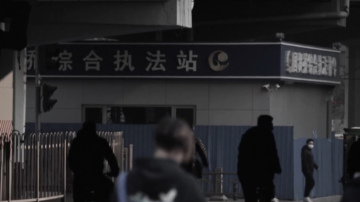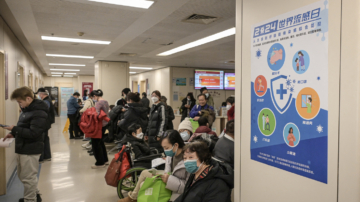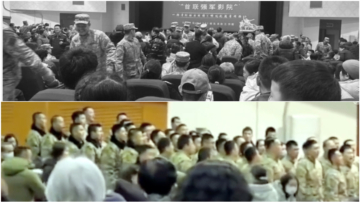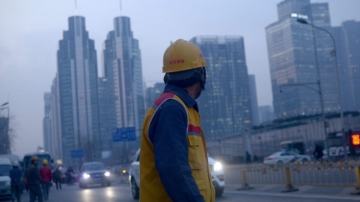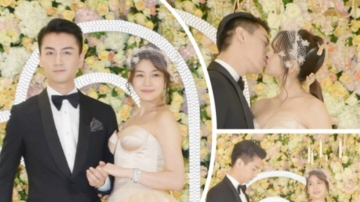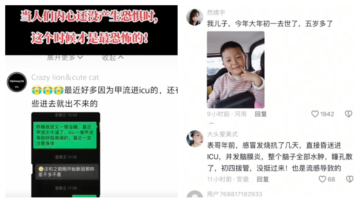【新唐人2013年12月28日訊】中共前總書記趙紫陽遺孀日前在北京去世。訃告中指出,趙夫人是在親人陪伴和「莊嚴助念」中,安詳辭世。趙紫陽女兒王雁南向本臺記者透露,她母親晚年接觸到佛法,留下遺言﹕喪事從簡。而趙紫陽的骨灰至今仍然安放家中,子女們準備將兩位老人合葬。
趙紫陽家人最近兩天向親朋好友發出短信說,趙紫陽夫人梁伯琪,「在家人陪伴下和莊嚴助念中」,於今年12月25號晚間在北京醫院辭世,寧靜安詳。享年95歲。
趙紫陽女兒王雁南告訴《新唐人》,他們家裡已經佈置了一個小小的靈堂,用來接待來悼念的親戚、朋友。
王雁南:「後事呢,因為母親有遺言,我們尊重母親的遺言,就是喪事從簡,不做遺體告別。只是做家庭式的告別。就是火化。火化完了以後還接媽媽回家。因為我父親(骨灰)也是在家裡的。那接下來怎麼辦的話,當然是入土為安。讓他們兩位老人家一起入土為安。」
趙紫陽在1989年民運中因同情抗議學生,遭到前中共領導人鄧小平罷黜,隨後被軟禁在家至死。據香港《蘋果日報》報導,趙紫陽於2005年1月去世後,因為當局要將他的骨灰放在 北京八寶山革命公墓的「司局級幹部區」,趙的家人覺得「顯然不合他的身份」,不同意當局的安排,於是將趙的骨灰一直存放在家中。
王雁南表示,父親骨灰至今沒有安葬,「是因為一直沒有得到好的安葬的方法」。子女們希望兩位老人家盡早的入土為安,但是安葬何處﹖目前還在商量。
在梁伯琪子女們發出的訃告中說,母親在「莊嚴助念中」安詳離世。「助念」是佛教用語,指某人臨終時,請別人幫助他念佛,用念佛的功德,讓他安樂自在,往生佛國。
王雁南透露,她的母親晚年接觸到佛法。
王雁南:「我不知道我父親(的信仰),應該沒有。我母親有接觸到佛法。助念就是說在心中懷著美好的願望,幫助母親能夠……有說往生極樂,有說一路平安,安息,各種各樣美好的願望。」
王雁南說,父親趙紫陽去世的時候,母親身體已經很差了,梁伯琪直到臨終,都不知道趙紫陽已經去世。
王雁南:「我們也是為了不忍心讓她受這個打擊,所以沒有告訴。當然母親很快就有一些老年癡呆的症狀。後來常常會忘記。就不提這個事了。是,我們一直沒有告訴她。」
但是趙紫陽的祕書鮑彤告訴《新唐人》,他在2008年探訪梁伯琪的時候,感覺她心裡是明白趙紫陽已經去世了。
前中共總書記趙紫陽祕書鮑彤:「我認為她是知道趙紫陽已經去世了。我想只是因為很悲痛,也不必談這些事情了。所以她也沒有跟子女談這個事情而已。我2008年看到她的時候,她還是很清楚的。她記得我是誰,她還跟我說話。但是她講話的裡面的內容,使我能夠理解,她早就知道趙紫陽去世了。」
對於鮑彤的猜測,王雁南認為,有可能是她的父母心靈相通。
王雁南:「也有可能。我想他們也會息息相通,心靈是相通的。」
有媒體報導,趙紫陽升任黨和國家領導人後,全家雖在中南海生活,但梁伯琪並沒有北京戶口。關於這一點,王雁南對《新唐人》作了澄清。
王雁南:「有戶口,通常這樣的,他們一開始可能是集體戶口,集體是跟機關。後來應該是轉到住地了。當地街道。」
趙紫陽被罷黜後,先是被軟禁於中南海家中。隨後,他被「安置」在位於北京燈市口西街的富強胡同6號 。從此「富強胡同6號」便成了「軍事管制區」。趙紫陽就在這個軍事管制的軟禁中度過了16年,直到2005年1月17號逝世。
採訪編輯/秦雪 後製/李勇
Zhao Ziyang's Widow Passes Away
Widow of late CCP chief Zhao Ziyang
died in Beijing this week.
Her obituary says she serenely passed away in the company
of her family members who made Buddhist prayers with her.
Her daughter Wang Yannan told our reporter that
after her mother's encounter with Buddhism,
her last wish was to just have a very simple funeral.
Zhao Ziyang's ashes remain at his family's home.
Their children are preparing to bury their parents together
in their final resting place.
Zhao's family recently sent text messages to relatives and
friends, saying that Zhao's wife Liang Boqi passed away
“with family members as company while solemnly
making Buddhist prayers,” in Beijing Hospital
on the night of Dec. 25, at the ripe age of 95 years old.
Zhao's daughter Wang Yannan told NTD a small mourning hall
has been set up in their home for receiving relatives and friends.
Wang Yannan: “Because mother's last wishes were to have
the funeral be as simple as possible, and we respect her wish.
We'll only have a family-style mourning
without a formal funeral service.
She'll directly be cremated, and then we will bring her ashes
back home because my [father's ashes] are also there.
Then we will bury their ashes together. ”
Because Zhao Ziyang sympathized with the student protesters
during the Democracy Movement in 1989, he was dismissed
from his position as Party Chief by ex-CCP leader
Deng Xiaoping and later put under house arrest until he died.
Hong Kong's Apple Daily reports that after Zhao Ziyang died
in January 2005, CCP authorities prepared to put his ashes
in an area reserved for department and bureau level officials
in Beijing's Babaoshan Revolutionary Cemetery.
Zhao's family thought such an arrangement was
“obviously inconsistent with Zhao's identity”
and did not agree it.
Zhao's ashes have remained at home until now.
Wang Yannan says her father's ashes have not been buried
until now “because a good burial hasn't yet been decided on.”
Her siblings hope to bury the parents as soon as possible
but are still negotiating where to bury them.
The obituary issued by Liang Boqi's children
says the mother serenely passed away
in the midst of reciting a Buddhist prayer.
During such a prayer, family members would together pray to
have the person on their deathbed enjoy happiness by merit of
praying to the Buddha and have them go to Buddha's heaven.
Wang Yannan says her mother had encountered Buddhism
in her later years.
Wang Yannan: “I don't know [my father's faith], I don't think
he held one. My mother knew of Buddhism.
[The prayers we joined her in] are to cherish best wishes,
praying with her to… some say so she can go to the heaven,
or to have a peaceful future, or various other good wishes.”
Wang Yannan says her mother's health was very bad
at the time of her father Zhao Ziyang's death.
Liang Boqi had no idea of Zhao Ziyang's death
even when she died.
Wang Yannan: “We couldn't bear to let her receive such a hit.
So this was not told to her.
My mother soon had minor symptoms of dementia.
Later she often forgot things. So we raise the issue.
Yes, we hadn't told her all this time.”
However, Zhao Ziyang's secretary Bao Tong told NTD that
when he visited Liang Boqi in 2008,
he sensed that she knew of Zhao's death at heart.
Bao Tong: “I think she knew of Zhao Ziyang's death.
She was in a deep sorrow and had no need to talk about it.
So she did not mention it with her children.
When I visited her in 2008, she was still very clearminded.
She remembered who I was and talked to me.
Some particular things she spoke of made me understand that
she knew Zhao's death very early.”
From Bao Tong's analysis, Wang Yannan says
she thinks that her parents must be connected at heart.
Wang Yannan: “Bao Tong may be right. I think they might
be telepathic with each other, or connected at heart.”
After Zhao Ziyang was promoted to being CCP chief, his wife
Liang Boqi reportedly had no Beijing hukou (a registered
residential certificate) despite his family living in Zhongnanhai.
Wang Yannan clarifies this point.
Wang Yannan: “She had a hukou. Usually, she may have had
a collective hukou, for governmental department employees.
But afterwards, her certificate ought to have been transferred
to a home address, the local street's administrative unit.”
After Zhao Ziyang was ousted,
he was then under house arrest in Zhongnanhai.
Later, he was relocated to No. 6 Fuqiang Hutong and
Dengshikou West street, Beijing.
“No. 6 Fuqiang Hutong” was then
changed into a “military controlled area.”
Zhao spent 16 years here under house arrest
until he died on Jan. 17 , 2005.
Interview & Edit/QinXue Post-Production/LiYong
趙紫陽家人最近兩天向親朋好友發出短信說,趙紫陽夫人梁伯琪,「在家人陪伴下和莊嚴助念中」,於今年12月25號晚間在北京醫院辭世,寧靜安詳。享年95歲。
趙紫陽女兒王雁南告訴《新唐人》,他們家裡已經佈置了一個小小的靈堂,用來接待來悼念的親戚、朋友。
王雁南:「後事呢,因為母親有遺言,我們尊重母親的遺言,就是喪事從簡,不做遺體告別。只是做家庭式的告別。就是火化。火化完了以後還接媽媽回家。因為我父親(骨灰)也是在家裡的。那接下來怎麼辦的話,當然是入土為安。讓他們兩位老人家一起入土為安。」
趙紫陽在1989年民運中因同情抗議學生,遭到前中共領導人鄧小平罷黜,隨後被軟禁在家至死。據香港《蘋果日報》報導,趙紫陽於2005年1月去世後,因為當局要將他的骨灰放在 北京八寶山革命公墓的「司局級幹部區」,趙的家人覺得「顯然不合他的身份」,不同意當局的安排,於是將趙的骨灰一直存放在家中。
王雁南表示,父親骨灰至今沒有安葬,「是因為一直沒有得到好的安葬的方法」。子女們希望兩位老人家盡早的入土為安,但是安葬何處﹖目前還在商量。
在梁伯琪子女們發出的訃告中說,母親在「莊嚴助念中」安詳離世。「助念」是佛教用語,指某人臨終時,請別人幫助他念佛,用念佛的功德,讓他安樂自在,往生佛國。
王雁南透露,她的母親晚年接觸到佛法。
王雁南:「我不知道我父親(的信仰),應該沒有。我母親有接觸到佛法。助念就是說在心中懷著美好的願望,幫助母親能夠……有說往生極樂,有說一路平安,安息,各種各樣美好的願望。」
王雁南說,父親趙紫陽去世的時候,母親身體已經很差了,梁伯琪直到臨終,都不知道趙紫陽已經去世。
王雁南:「我們也是為了不忍心讓她受這個打擊,所以沒有告訴。當然母親很快就有一些老年癡呆的症狀。後來常常會忘記。就不提這個事了。是,我們一直沒有告訴她。」
但是趙紫陽的祕書鮑彤告訴《新唐人》,他在2008年探訪梁伯琪的時候,感覺她心裡是明白趙紫陽已經去世了。
前中共總書記趙紫陽祕書鮑彤:「我認為她是知道趙紫陽已經去世了。我想只是因為很悲痛,也不必談這些事情了。所以她也沒有跟子女談這個事情而已。我2008年看到她的時候,她還是很清楚的。她記得我是誰,她還跟我說話。但是她講話的裡面的內容,使我能夠理解,她早就知道趙紫陽去世了。」
對於鮑彤的猜測,王雁南認為,有可能是她的父母心靈相通。
王雁南:「也有可能。我想他們也會息息相通,心靈是相通的。」
有媒體報導,趙紫陽升任黨和國家領導人後,全家雖在中南海生活,但梁伯琪並沒有北京戶口。關於這一點,王雁南對《新唐人》作了澄清。
王雁南:「有戶口,通常這樣的,他們一開始可能是集體戶口,集體是跟機關。後來應該是轉到住地了。當地街道。」
趙紫陽被罷黜後,先是被軟禁於中南海家中。隨後,他被「安置」在位於北京燈市口西街的富強胡同6號 。從此「富強胡同6號」便成了「軍事管制區」。趙紫陽就在這個軍事管制的軟禁中度過了16年,直到2005年1月17號逝世。
採訪編輯/秦雪 後製/李勇
Zhao Ziyang's Widow Passes Away
Widow of late CCP chief Zhao Ziyang
died in Beijing this week.
Her obituary says she serenely passed away in the company
of her family members who made Buddhist prayers with her.
Her daughter Wang Yannan told our reporter that
after her mother's encounter with Buddhism,
her last wish was to just have a very simple funeral.
Zhao Ziyang's ashes remain at his family's home.
Their children are preparing to bury their parents together
in their final resting place.
Zhao's family recently sent text messages to relatives and
friends, saying that Zhao's wife Liang Boqi passed away
“with family members as company while solemnly
making Buddhist prayers,” in Beijing Hospital
on the night of Dec. 25, at the ripe age of 95 years old.
Zhao's daughter Wang Yannan told NTD a small mourning hall
has been set up in their home for receiving relatives and friends.
Wang Yannan: “Because mother's last wishes were to have
the funeral be as simple as possible, and we respect her wish.
We'll only have a family-style mourning
without a formal funeral service.
She'll directly be cremated, and then we will bring her ashes
back home because my [father's ashes] are also there.
Then we will bury their ashes together. ”
Because Zhao Ziyang sympathized with the student protesters
during the Democracy Movement in 1989, he was dismissed
from his position as Party Chief by ex-CCP leader
Deng Xiaoping and later put under house arrest until he died.
Hong Kong's Apple Daily reports that after Zhao Ziyang died
in January 2005, CCP authorities prepared to put his ashes
in an area reserved for department and bureau level officials
in Beijing's Babaoshan Revolutionary Cemetery.
Zhao's family thought such an arrangement was
“obviously inconsistent with Zhao's identity”
and did not agree it.
Zhao's ashes have remained at home until now.
Wang Yannan says her father's ashes have not been buried
until now “because a good burial hasn't yet been decided on.”
Her siblings hope to bury the parents as soon as possible
but are still negotiating where to bury them.
The obituary issued by Liang Boqi's children
says the mother serenely passed away
in the midst of reciting a Buddhist prayer.
During such a prayer, family members would together pray to
have the person on their deathbed enjoy happiness by merit of
praying to the Buddha and have them go to Buddha's heaven.
Wang Yannan says her mother had encountered Buddhism
in her later years.
Wang Yannan: “I don't know [my father's faith], I don't think
he held one. My mother knew of Buddhism.
[The prayers we joined her in] are to cherish best wishes,
praying with her to… some say so she can go to the heaven,
or to have a peaceful future, or various other good wishes.”
Wang Yannan says her mother's health was very bad
at the time of her father Zhao Ziyang's death.
Liang Boqi had no idea of Zhao Ziyang's death
even when she died.
Wang Yannan: “We couldn't bear to let her receive such a hit.
So this was not told to her.
My mother soon had minor symptoms of dementia.
Later she often forgot things. So we raise the issue.
Yes, we hadn't told her all this time.”
However, Zhao Ziyang's secretary Bao Tong told NTD that
when he visited Liang Boqi in 2008,
he sensed that she knew of Zhao's death at heart.
Bao Tong: “I think she knew of Zhao Ziyang's death.
She was in a deep sorrow and had no need to talk about it.
So she did not mention it with her children.
When I visited her in 2008, she was still very clearminded.
She remembered who I was and talked to me.
Some particular things she spoke of made me understand that
she knew Zhao's death very early.”
From Bao Tong's analysis, Wang Yannan says
she thinks that her parents must be connected at heart.
Wang Yannan: “Bao Tong may be right. I think they might
be telepathic with each other, or connected at heart.”
After Zhao Ziyang was promoted to being CCP chief, his wife
Liang Boqi reportedly had no Beijing hukou (a registered
residential certificate) despite his family living in Zhongnanhai.
Wang Yannan clarifies this point.
Wang Yannan: “She had a hukou. Usually, she may have had
a collective hukou, for governmental department employees.
But afterwards, her certificate ought to have been transferred
to a home address, the local street's administrative unit.”
After Zhao Ziyang was ousted,
he was then under house arrest in Zhongnanhai.
Later, he was relocated to No. 6 Fuqiang Hutong and
Dengshikou West street, Beijing.
“No. 6 Fuqiang Hutong” was then
changed into a “military controlled area.”
Zhao spent 16 years here under house arrest
until he died on Jan. 17 , 2005.
Interview & Edit/QinXue Post-Production/LiYong

